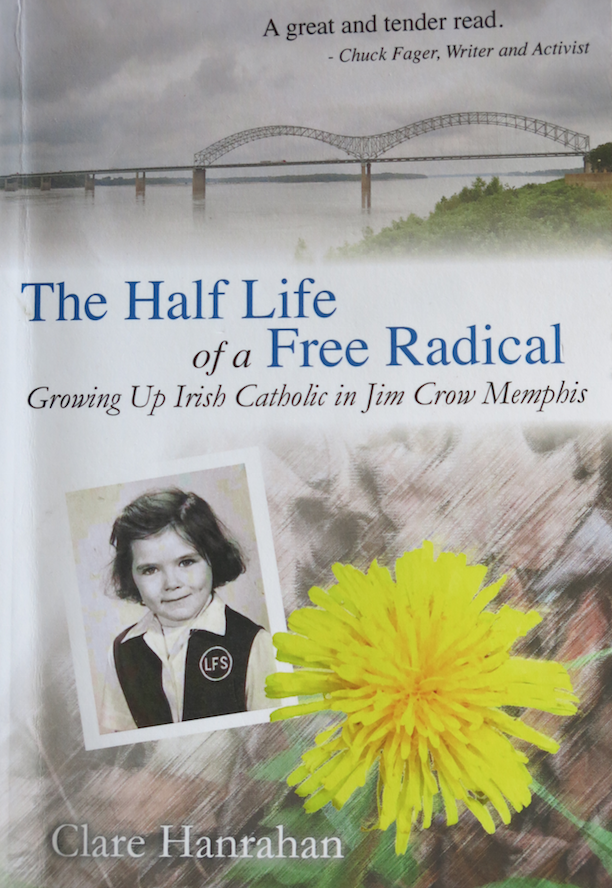
It’s hard to pin down local author Clare Hanrahan’s latest book, The Half Life of a Free Radical: Growing Up Irish Catholic in Jim Crow Memphis. Part history, part memoir, part dreamcatcher, part adventure story, it defies easy categorization.
As the title suggests, much of the book focuses on the author’s early years in Memphis during the 1950s and ’60s. Desegregation, Elvis, the assassinations of President Kennedy and Martin Luther King Jr. all get a mention.
Seeking to better understand her own childhood experiences, however, Hanrahan also looks to the more distant past, tracing her lineage back to the early 1800s. Tied in with these familial accounts of love and loss are the social and political issues faced by prior generations, many of which eerily echo present-day events.
The great flood of 1927, for example, displaced over 200,000 people, two-thirds of them black field laborers and their families. “People of color in the Delta,” writes Hanrahan, “were herded into camps and denied adequate food, medical treatment and shelter. Relief administrators siphoned off funds and supplies.”
The author then juxtaposes that disaster with 2005’s Hurricane Katrina. In both instances, notes Hanrahan, the Mississippi inundated African-American communities. And in the latter case, displaced residents were directed to the Louisiana Superdome, where they were “abandoned for days without adequate food, medical treatment or shelter.”
The book’s early chapters repeatedly employ this back-and-forth technique, highlighting the author’s own family connections to drive home the similarities between then and now. Her mother, for example, who was 10 years old in 1927, lived in an area affected by the flood. And while readers might initially be tempted to attribute the authorities’ poor decisions and immoral behavior to the simple fact that it all happened so long ago, the more recent events to which she draws comparisons quickly challenge and disrupt that notion.
Besides helping readers connect with the past, the technique also allows, if not forces, them to view the present through a historical lens. How will the events unfolding now be remembered when time has washed away our current defenses and justifications? What will future generations think of our behavior?
Half Life also seeks to demystify the radical: that perplexing figure who challenges the status quo. In 2000, Hanrahan was arrested during a peaceful protest at Fort Benning, Ga., and spent six months in a federal prison. For many, the story might begin and end right there: just another crazy, nut-job liberal. But the book aims to capture her gradual transformation into conscious citizen and activist. The fourth child of nine, she recounts such simple struggles as fighting for a place to sit at the dining room table, seeking a private moment in the bathroom, impatiently noting the slow progress of her developing breasts.
These anecdotes, however, impede the book’s pace and dilute the focus. Part of the problem is that Hanrahan tends to end sections with broad, bold statements about government lies and corruption, presumably meant to intrigue readers. But by sandwiching them between seemingly unrelated events, she leaves the reader wishing for more substantiation.
The second half of the book follows Hanrahan out into the greater world, though she returns to Memphis time and time again. Her writing is at its best when it’s most specific, vividly depicting particular experiences culled from a wildly unconventional life.
The details of the time she spent living on a shanty boat floating down the Mississippi, for example, create a seamless narrative, albeit one that’s still politically and environmentally motivated.
This section also serves up some of Hanrahan’s deepest moments of self-reflection on the consequences of a nomadic lifestyle — particularly the strains it created between her and her daughter. Those brief passages left this reader, at least, wondering whether the author might have another book up her sleeve.
On Wednesday, July 27, Clare Hanrahan will discuss her book at Firestorm Cafe & Books in West Asheville. On Thursday, Aug. 18, she’ll give a reading at Malaprop’s Bookstore/Cafe downtown. Both events start at 7 p.m.


Before you comment
The comments section is here to provide a platform for civil dialogue on the issues we face together as a local community. Xpress is committed to offering this platform for all voices, but when the tone of the discussion gets nasty or strays off topic, we believe many people choose not to participate. Xpress editors are determined to moderate comments to ensure a constructive interchange is maintained. All comments judged not to be in keeping with the spirit of civil discourse will be removed and repeat violators will be banned. See here for our terms of service. Thank you for being part of this effort to promote respectful discussion.